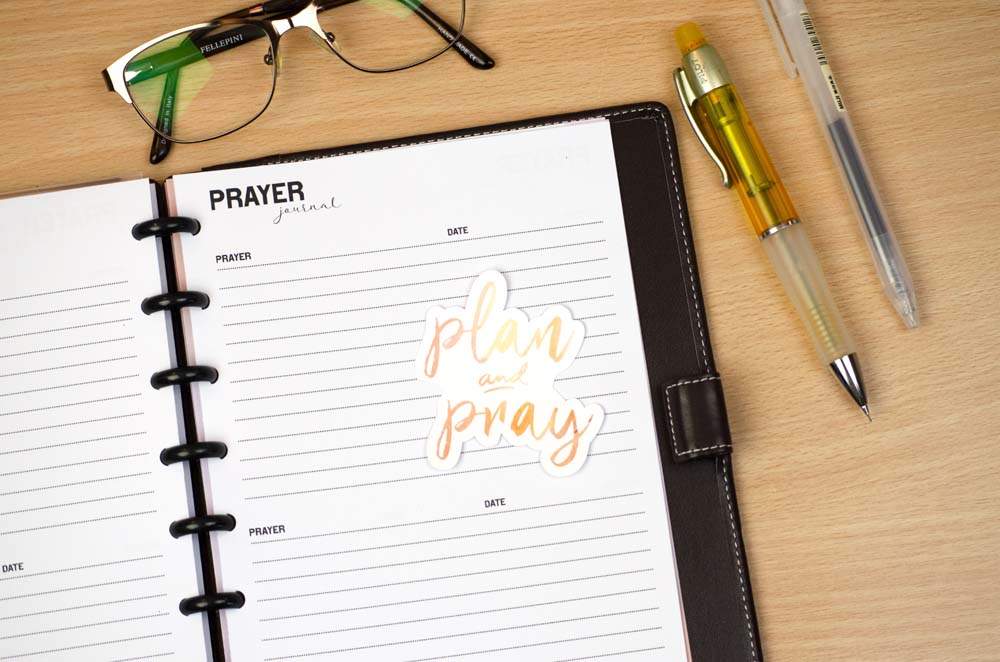The Transformative Power of Prayer Journaling
Your mind is racing, and all you can think is, “God, help!”
There have been more moments like this than I’d like to admit, not just during major crises, but in the quiet, relentless pressure of everyday life, deadlines, triggers, worries, and that constant feeling of overwhelm.
One day, in the middle of that chaos, I picked up a pen. I didn’t know what I’d write or if it would make a difference. I just started. One word at a time.
At first, the words were clumsy, scattered, almost like my thoughts were still fighting for attention. But slowly, as ink filled the pages, my mind began to untangle. My breathing grew steadier. I felt a quiet reassurance: God is in control, even when my world feels out of control.
Writing brought perspective. I started to see the situation more clearly, breaking it down, thought by thought. The panic didn’t vanish, but the chaos softened. Each word I wrote became a small act of surrender, a way of laying my fears, my frustrations, and even my hopes at God’s feet.
Prayer journaling doesn’t always provide immediate solutions. It doesn’t always make problems disappear or create instant joy. But it gives something just as precious: clarity, peace, and a tangible connection to God. It allows us to move from scattered thoughts to focused reflection, from anxiety to intentional trust.
The Science Behind the Practice
While personal experiences are powerful, scientific research also supports the benefits of journaling, including prayer journaling:
- Mental Health Benefits: A meta-analysis of studies found that journaling interventions resulted in a statistically significant reduction in mental health symptoms, particularly anxiety and PTSD, with an average reduction of 9% in anxiety symptoms and 6% in PTSD symptoms.
- Stress Reduction: Research indicates that expressive writing, such as journaling, can significantly reduce stress and anxiety levels. A 2018 study found that journaling for 15 minutes daily led to significant reductions in stress and anxiety.
- Spiritual Growth: Prayer journaling offers a unique opportunity to deepen one’s spiritual life. It provides a space to express raw and honest thoughts to God, fostering a closer relationship and greater spiritual clarity.

Why Does Prayer Journaling Work
Prayer journaling isn’t just about writing; it’s about creating a sacred space to connect with God. Here’s how it can transform your spiritual practice.
One of the first things you may notice when journaling your prayers is the gift of focus and clarity. Putting words on paper slows down racing thoughts and gives them structure. Instead of juggling a hundred things in your mind, you start to see your prayers form clearly, one sentence at a time. This simple act reduces mental clutter and helps you enter prayer with greater intention.
Prayer journaling also offers a gentle space for emotional release. When feelings feel tangled or overwhelming, writing them down allows you to express them honestly before God. In that safe release, many people find a sense of calm, healing, and peace, a reminder that they don’t need to carry everything on their own.
Beyond the moment, journaling creates room for spiritual reflection. Looking back at old entries, you begin to see the threads of God’s faithfulness woven through your story, prayers answered, strength given, or perspective shifted over time. This practice not only strengthens faith but also deepens gratitude.
Finally, there’s the gift of accountability. A prayer journal quietly invites you to return, day after day, and make space for this rhythm. Over time, it becomes more than a notebook; it becomes a companion to your spiritual life, helping prayer grow into a steady and life-giving practice.

Final Thoughts
Have you ever tried journaling your prayers? If not, I encourage you to give it a try. Just a pen, a blank page, and your heart, one word at a time. If you want to start and organise your writing, this previous article goes into how to structure a prayer journal.
Remember, prayer journaling is a personal journey. There’s no right or wrong way to do it. It’s about connecting with God in a way that feels authentic and meaningful to you.
Sources:
Photo by Sixteen Miles Out on Unsplash
Hi, I’m Karin, the heart behind Planning Faith. I write about faith, journaling, and gentle healing to encourage women on their journey. This is a place for more about: faith journaling | gentle healing practices | spiritual encouragement | finding peace after hardship | rebuilding life with hope


